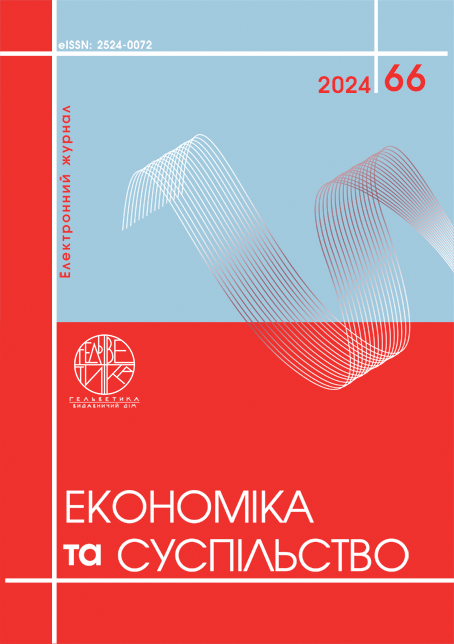THEORETICAL AND METHODOLOGICAL FOUNDATIONS OF FORMING ORGANIZATIONAL AND ECONOMIC LINKS IN AGRO-CLUSTERS
Abstract
The article examines the key aspects of the formation and functioning of agro-clusters as important elements for the sustainable development of agricultural enterprises. The study pays special attention to the theoretical foundations of organizing interaction between cluster participants, including producers, processing enterprises, research institutions, and government bodies. The significance of organizational and economic links within cluster structures is substantiated, as they contribute to the implementation of innovative technologies, improvement of environmental safety levels, and reduction of resource consumption. It has been revealed that existing barriers in the development of Ukraine's agricultural sector, particularly organizational and technical shortcomings, hinder the effective functioning of clusters. A two-level model of cluster structure organization is proposed, which, unlike existing ones, can serve as a foundation for the formation of an agricultural cluster and will allow for the optimal combination of various scale business units into a single integrated economic system. In particular, the proposed model foresees the development of a common systemic goal by the participants, to which individual goals are subordinated. It also allows for the realization of both economic and socio-economic connections and functions of the association. The research has identified opportunities to improve the organizational and economic mechanism of clusters to enhance interaction between enterprises, which will increase their competitiveness in domestic and foreign markets. Based on the principles of the two-level model of cluster structure organization in the agro-sector, a methodological approach is proposed for studying the organizational model of business entities within the agro-cluster structure. Unlike existing approaches, this allows for the study, analysis, evaluation, and systematization of existing links between agricultural sector enterprises, processing, and service industries and using them as a basis for organizing cluster associations, as well as determining and substantiating further cluster development paths, directions for optimizing organizational processes, and links between participants in the integrated structure.
References
Бакум В. В. Методологія розробки агропромислових кластерних утворень регіону. Економіка АПК. 2009. № 4. С. 38-44.
Frank E. V., Mashevskaya O. V., Ermolina L. V. Innovational Mechanism of Implementation of Cluster Initiatives in Business. European Research Studies. 2016. Issue 1. Vol. XIX. Р. 179–188.
Федорчук О.М, Петренко В.С., Карнаушенко А.С. Агропромислові кластери: проблеми, переваги та перспективи. Проблеми системного підходу в економіці. 2020. № 4(78). С. 63–69.
Онишко С. В. Державне регулювання кластеризації економіки як напрямок розбудови національної інноваційної моделі. Актуальні проблеми економіки. 2010. № 11. С. 55-61.
Ульянченко О. Ю. Методологічні засади формування кластерної політики в умовах глобалізації. Державне будівництво. 2010. № 2. URL: http://www.nbuv.gov.ua/e-journals/DeBu/2010-2/index.html (дата звернення: 31 серпня 2024 р.)
Derlukiewicz N., Mempel-Snie˙zyk A., Mankowska D., Dyjakon A., Minta S., Pilawka T. How do Clusters Foster Sustainable Development? An Analysis of EU Policies. Sustainability. 2020. № 12(7). Р. 1–15.
Ужва А.М. Кластеризація як ефективний інструмент управління розвитком регіонального аграрного бізнесу. Науковий вісник Херсонського державного університету. 2016. Випуск 19. Частина 2. С 110-113.
Журба І.О. Оцінювання результативності реалізації кластерних ініціатив регіону. Проблеми і перспективи економіки та управління, 2015. №2. С. 91-100
Porter M. E. How Competitive Forces Shape Strategy. Harvard Business Review. 1979.
Bakum, V.V. (2009) Metodolohiia rozrobky ahropromyslovykh klasternykh utvoren rehionu [Methodology for Developing Agro-Industrial Cluster Formations in the Region]. Ekonomika APK. № 4. pp. 38-44.
Frank, E.V., Mashevskaya, O.V., Ermolina, L. V. (2016) Innovational Mechanism of Implementation of Cluster Initiatives in Business. European Research Studies. Issue 1. Vol. 19. P. 179–188.
Fedorchuk, O.M., Petrenko, V.S., Karnaushenko, A.S. (2020) Ahropromyslovi klastery: problemy, perevahy ta perspektyvy [Agro-industrial clusters: problems, advantages, and prospects]. Problemy systemnoho pidkhodu v ekonomitsi. № 4(78). pp. 63-69.
Onyshko, S.V. (2010) Derzhavne rehuliuvannia klasteryzatsii ekonomiky yak napriamok rozbudovy natsionalnoi innovatsiinoi modeli [State regulation of clusterization of the economy as a direction for building the national innovation model]. Aktualni problemy ekonomiky. № 11. pp. 55-61.
Uliianchenko, O. Yu. (2010) Metodolohichni zasady formuvannia klasternoi polityky v umovakh hlobalizatsii [Methodological principles of cluster policy formation in the context of globalization]. Derzhavne budivnytstvo. № 2. Available at: http://www.nbuv.gov.ua/e-journals/DeBu/2010-2/index.html (accessed, August 31 2024)
Derlukiewicz, N., Mempel-Snie˙zyk, A., Mankowska, D., Dyjakon, A., Minta, S., Pilawka, T. (2020) How do Clusters Foster Sustainable Development? An Analysis of EU Policies. Sustainability. № 12(7). Р. 1–15.
Uzhva, A. M. (2016) Klasteryzatsiia yak efektyvnyi instrument upravlinnia rozvytkom rehionalnoho ahrarnoho biznesu [Clusterization as an effective tool for managing the development of regional agribusiness ]. Naukovyi visnyk Khersonskoho derzhavnoho universytetu. Vol. 19. part 2. pp. 110-113.
Zhurba, I. O. (2015) Otsiniuvannia rezultatyvnosti realizatsii klasternykh initsiatyv rehionu [Evaluation of the effectiveness of implementing cluster initiatives in the region]. Problemy i perspektyvy ekonomiky ta upravlinnia, №2. pp. 91-100
Porter, M. E. (1979) How Competitive Forces Shape Strategy. Harvard Business Review.


